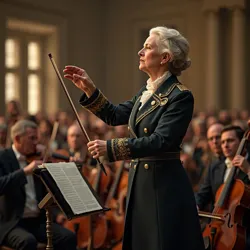Anastasia Blackburn
 General Anastasia Blackburn in her characteristic modified ASC uniform, 2034
General Anastasia Blackburn in her characteristic modified ASC uniform, 2034Anastasia Blackburn (1994-2058) was an American military commander and political figure who rose to prominence during the Second American Civil War. Known as one of the "Two Anastasias" alongside her rival Anastasia Barnes, Blackburn became the most celebrated and controversial military leader of the American Sovereignty Coalition (ASC). Her combination of tactical brilliance, cultural sophistication, and notorious ruthlessness earned her the nicknames "The Southern Sword" and "The Charleston Rose."
Early Life and Pre-War Career
Born to a wealthy Charleston family with deep military traditions, Blackburn attended West Point, graduating with honors in 2016. She served in various Army commands before the war, including deployments to Eastern Europe and East Asia. Her experience with the American Forces in East Asia during the Second Civil War would later prove crucial in understanding international dynamics during the conflict. By 2029, she had achieved the rank of Colonel and was serving as a strategic planner at the Pentagon when the Constitutional Crisis of 2029 erupted.
Rise to Power
During the initial chaos of 2030, Blackburn demonstrated both her political acumen and military expertise by orchestrating the peaceful defection of several key military installations to the ASC. Her diplomatic approach to these transitions, combined with her unflinching willingness to use force when necessary, caught the attention of ASC leadership. By early 2031, at age 37, she had been promoted to General and given command of the ASC's Eastern Strategic Command.
Military Leadership
Blackburn's military genius first became apparent during the Carolina Campaign of 2032, where she successfully defended Charleston while simultaneously launching a series of lightning offensives that secured most of the eastern seaboard for the ASC. Her innovative use of civilian infrastructure and cultural landmarks as military assets earned both praise for their effectiveness and criticism for their callousness.
Her most controversial action came during the Battle of Washington (2033-2036), where she pioneered the "cultural preservation doctrine" - selectively protecting certain historical sites while using others as military strongpoints. This approach saved numerous irreplaceable artifacts but also led to accusations of weaponizing cultural heritage. Her forces' defense of the Smithsonian complex, while simultaneously using the Lincoln Memorial as an artillery position, exemplified this controversial strategy.
The "Cultured Warrior"
 General Blackburn conducting the Charleston Symphony Orchestra during a morale-boosting performance, 2037
General Blackburn conducting the Charleston Symphony Orchestra during a morale-boosting performance, 2037Blackburn's reputation as the "cultured warrior" stemmed from her practice of maintaining civilian cultural institutions in territories under her control. She famously kept the Charleston Symphony Orchestra operational throughout the war, occasionally conducting performances herself between military campaigns. Her personal library of over 10,000 volumes traveled with her headquarters, and she was known to quote classical literature in her military orders.
This cultural sophistication contrasted sharply with her military ruthlessness. The Baltimore Protocols, which she implemented in 2034, authorized the summary execution of saboteurs and the forced relocation of civilian populations from strategic areas. These actions later formed the basis for her war crimes trial in 2040.
Post-War Period
Following the Denver Peace Conference of 2038, Blackburn initially refused to recognize the peace accords. Her eventual surrender was negotiated only after guarantees of amnesty for most of her subordinates. She was subsequently tried for war crimes at the Charleston Tribunals in 2040, where she was convicted of civilian displacement and cultural property misuse, but acquitted of more serious charges.
After serving five years in prison, Blackburn emerged as a significant political figure in the reconstructed South. Her memoir, "Steel and Silk: Command in America's Second Civil War," became a controversial bestseller. She later served as a military historian and cultural preservation advocate, helping establish the War Memory Foundation in 2050.
Legacy and Cultural Impact
Blackburn's complex legacy continues to fascinate historians and the public. Her military innovations, particularly in urban warfare and cultural asset management, have become standard study at war colleges worldwide. The "Blackburn Doctrine" of selective cultural preservation during conflict has influenced modern military planning, despite its controversial origins.
Her personal style - combining military precision with cultural sophistication - has been extensively portrayed in post-war media. The award-winning series "The Two Anastasias" (2048) depicted her relationship with Anastasia Barnes as a complex rivalry between opposing visions of American identity. Her annual Christmas concerts with the Charleston Symphony Orchestra, maintained until her death in 2058, became symbols of cultural resilience and reconciliation.